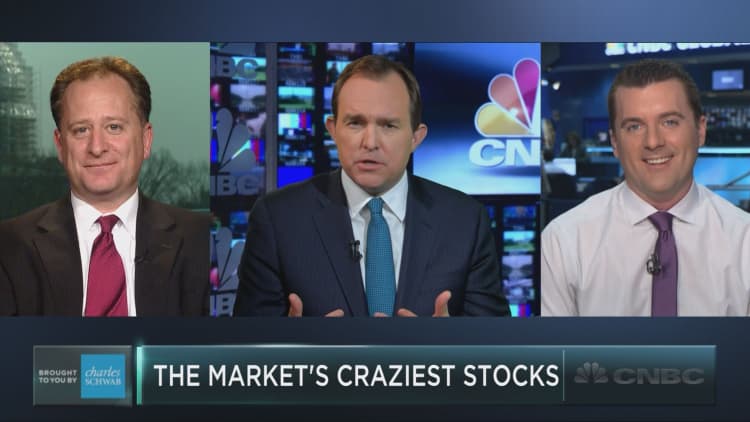


If you often pursue the list of stocks that have risen or fallen the most on any given day, four companies have likely become quite familiar to you: Chesapeake Energy, Southwestern Energy, Williams Companies and Freeport-McMoRan.
These ultra-volatile stocks will make moves on a daily basis the likes of which more stable names would only see once a year.
For example, Chesapeake, the jumpiest of the bunch, has moved 8.9 percent in its average 2016 session. The second-smallest move it's seen all year was its 1.01 percent rise on Feb. 19. Coca-Cola shares, in contrast, haven't seen a 1 percent move since October.
For Chesapeake and Southwestern, this year has somewhat recalled a roller coaster, constituted of gut-wrenching rises and zero-gravity drops that all eventually led to roughly the same ending point where the journey began. Chesapeake and Southwestern are up 3 percent and 5 percent, respectively, which is smaller than their mean and median one-day moves for 2016.
Someone holding equal amounts of Freeport and Williams, meanwhile, would also find themselves roughly even: The former has risen 35 percent this year while the latter has dropped 32 percent.
When you buy or short these stocks, "you're really riding the oil tiger all the way up or all the way down," Eddy Elfenbein of the Crossing Wall Street blog said Tuesday on CNBC's "Trading Nation."
Indeed, all four names are highly levered to the price of commodities, and particularly crude oil.
Read More The problem with the commodity bounce: 'There's no juice there'
They are also, well, highly levered. S&P rates Chesapeake's credit "CCC," which it defines as putting bondholders vulnerable to nonpayment, and calls its debt "unsustainable." The other companies' debt is also rated below investment grade.
When it comes to a company like Chesapeake, the best way to think of the share price is to view it as an option itself, advises Dennis Davitt of Harvest Volatility Advisors. After all, if the company goes bankrupt, its stock will be worth zero; if the company makes a turnaround on the back of rising energy prices, it could be worth substantially more.
A corollary to that would be to call purchasing a stock like Chesapeake "investing" may be a bridge too far. It is more like speculating on derivatives.
"I don't think there's any reason to be a hero with these stocks," Elfenbein said.
Want to be part of the Trading Nation? If you'd like to call into our live Monday show, email your name, number, and question to TradingNation@cnbc.com.






